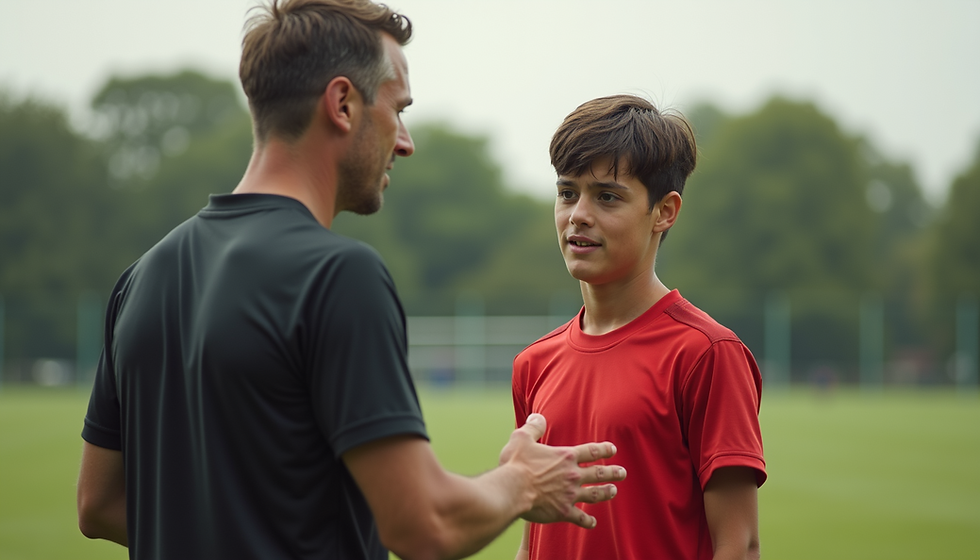How to Undertake Assessments in CBT for Athletes: A Complete Guide
- Dr Paul McCarthy

- Aug 11, 2025
- 7 min read

Introduction
Implementing CBT for athletes requires a structured assessment approach to identify specific mental challenges. As the mental aspect of sports continues to gain recognition, the demand for effective psychological interventions has grown substantially. Cognitive Behavioral Therapy (CBT) has emerged as one of the most effective approaches for enhancing athletic performance and addressing mental health concerns in sports. However, the effectiveness of CBT for athletes depends largely on the quality of initial and ongoing assessments. This comprehensive guide will walk you through the process of undertaking assessments in CBT specifically tailored for athletic populations.
Understanding CBT for Athletes: The Basics of Assessment
CBT for athletes focuses on identifying and modifying dysfunctional thought patterns that impact performance. Unlike general psychological assessments, CBT assessments for athletes must consider the unique demands of competitive sports environments. These assessments form the foundation for understanding how an athlete’s thoughts, emotions, and behaviors interact to influence their performance.
The assessment process in CBT for athletes typically involves three core components:
Cognitive Assessment: Evaluating thought patterns related to performance, competition, and self-efficacy
Behavioral Analysis: Examining action patterns including training adherence and competition routines
Emotional Evaluation: Gauging emotional control, stress management, and anxiety levels
Research supports the effectiveness of cognitive behavioral therapy for athletes when assessments are properly conducted. A well-executed assessment provides the roadmap for the entire intervention process, ensuring that treatment is targeted and effective.
The Role of CBT Sports Psychology in Athletic Performance
The field of CBT sports psychology has developed specialized assessment tools for athletic populations. These tools are designed to capture the unique psychological demands placed on athletes across different sports and competitive levels. Practitioners of CBT sports psychology emphasize the importance of tailored assessments for each athlete.
When conducting assessments within a sports psychology framework, it’s essential to consider:
Sport-specific cognitive demands
Performance pressure contexts
Team dynamics (for team sports)
Individual performance expectations
Competition-related anxiety patterns
Understanding the principles of CBT sports psychology is essential for conducting effective assessments. The integration of sports science with psychological principles creates a more comprehensive approach to athlete assessment and intervention.

How CBT for Sports Performance Assessments Work
Proper assessment techniques in CBT for sports performance focus on identifying cognitive patterns that impact athletic achievement. These assessments go beyond general psychological evaluations by specifically targeting performance-related thoughts, behaviors, and emotions.
The assessment process typically follows this structure:
Initial Evaluation
The first phase involves gathering comprehensive information about the athlete’s:
Performance history and patterns
Current psychological challenges
Sport-specific demands
Previous mental training experience
Goals and expectations
This information provides the foundation for understanding the athlete’s unique needs and challenges. Coaches increasingly recognize the value of CBT for sports performance when supported by thorough assessment protocols.
Standardized Assessment Tools
Several validated assessment instruments are commonly used in sports psychology:
Sport Anxiety Scale (SAS)
Athletic Coping Skills Inventory (ACSI)
Test of Performance Strategies (TOPS)
Competitive State Anxiety Inventory-2 (CSAI-2)
Sport Confidence Inventory
These tools provide quantifiable data that helps establish baselines and track progress throughout the intervention process. Athletes seeking to optimize their mental game often turn to CBT for sports performance assessment to gain objective insights into their psychological functioning.
Essential CBT Techniques for Athletes: Assessment Methods
Effective CBT techniques for athletes begin with comprehensive psychological assessment. The assessment phase employs various methods to gather relevant information:
Structured Interviews
Structured interviews allow practitioners to gather detailed information about:
Performance history
Current challenges
Situational triggers
Coping strategies
Goals and expectations
These interviews provide context for understanding the athlete’s unique experiences and challenges. Implementing various CBT techniques for athletes requires understanding their unique mental challenges, which these interviews help uncover.
Thought Records and Cognitive Mapping
Athletes are often asked to document their thoughts before, during, and after performance situations. This process helps identify:
Automatic negative thoughts
Performance-limiting beliefs
Cognitive distortions
Thought patterns associated with optimal performance
These records provide valuable insights into the athlete’s cognitive processes and how they influence performance outcomes.
Behavioral Analysis
Observing and documenting behavioral patterns helps identify:
Pre-performance routines
Responses to success and failure
Training behaviors
Team interactions
Stress responses
This analysis provides a comprehensive understanding of how thoughts translate into actions in the athletic context.
Implementing Cognitive Behavioral Therapy for Athletes: Assessment Framework
The process of cognitive behavioral therapy for athletes starts with identifying performance-limiting thought patterns. A structured assessment framework ensures that all relevant aspects are evaluated systematically.
Step 1: Establish Assessment Goals
Before beginning the assessment process, clearly define what you hope to achieve. This might include:
Identifying performance barriers
Understanding anxiety triggers
Evaluating current coping strategies
Assessing motivation and commitment
Determining readiness for change
Clear goals help focus the assessment process and ensure that relevant information is gathered.
Step 2: Select Appropriate Assessment Methods
Based on the assessment goals, select the most appropriate methods:
Standardized psychological tests
Sport-specific performance measures
Cognitive assessment tools
Behavioral observation protocols
Physiological measures (if available)
The combination of methods should provide a comprehensive picture of the athlete’s psychological functioning.
Step 3: Gather Baseline Data
Collect initial data to establish a baseline for comparison:
Current performance metrics
Psychological test scores
Self-reported thoughts and emotions
Observer ratings of behavior
Physiological measures (if applicable)
This baseline data will serve as a reference point for measuring progress throughout the intervention.
Step 4: Analyze and Interpret Results
Once data is collected, analyze it to identify:
Patterns and trends
Strengths and resources
Areas for improvement
Potential intervention targets
Factors that may influence treatment outcomes
Proper interpretation of assessment results is crucial for developing an effective intervention plan.
Key Benefits of CBT for Athletes: Evidence-Based Outcomes
The benefits of CBT for athletes include improved focus, reduced anxiety, and enhanced performance resilience. Research has consistently demonstrated positive outcomes when CBT interventions are based on thorough assessments.
A study involving youth rowers showed significant improvements after a 10-week CBT program that began with comprehensive assessment:
Enhanced stress management capabilities
Improved performance evaluation
Greater mental resilience
Reduced competition anxiety
Improved focus during high-pressure situations
Athletes experience numerous benefits of CBT for athletes when assessments target their specific needs. The personalized nature of CBT interventions, guided by thorough assessment, contributes to their effectiveness.
The Connection Between CBT and Sports Performance Improvement
Research supports a strong connection between CBT and sports performance improvement. When assessments accurately identify cognitive and behavioral patterns that limit performance, interventions can be precisely targeted.
Key findings from research include:
Athletes who received CBT interventions based on thorough assessments showed greater performance improvements than control groups
Female athletes demonstrated more significant improvements in performance evaluation following CBT interventions
Athletes with high levels of performance anxiety showed the most substantial benefits from CBT approaches
These findings highlight the importance of accurate assessment in maximizing the benefits of CBT interventions.
Understanding How CBT Helps Athletes Through Proper Assessment
Understanding how CBT helps athletes begins with recognizing the role of assessment in the therapeutic process. Properly conducted assessments provide insights into:
How thoughts influence performance
The relationship between emotions and athletic execution
Behavioral patterns that support or hinder achievement
Environmental factors that impact psychological functioning
Resources and strengths that can be leveraged
These insights guide the development of targeted interventions that address the specific needs of each athlete.
Implementing CBT Strategies for Sports: A Practical Approach
Implementing CBT strategies for sports requires a systematic approach that begins with thorough assessment. The practical implementation process typically follows these steps:
Comprehensive Assessment: Gather information about cognitive, emotional, and behavioral patterns
Collaborative Goal Setting: Work with the athlete to establish clear, measurable goals
Intervention Design: Develop a customized intervention plan based on assessment findings
Implementation: Apply CBT techniques in training and competition contexts
Ongoing Evaluation: Continuously assess progress and adjust interventions as needed
This structured approach ensures that interventions are targeted and effective. Sports psychologists use specialized CBT assessments for athletes to identify performance-limiting beliefs that can then be addressed through specific interventions.
Types of CBT Assessments for Athletes: A Comprehensive Overview
Properly conducted CBT assessments for athletes provide the foundation for effective intervention strategies. These assessments fall into several categories:
Cognitive Assessments
These focus on identifying thought patterns that impact performance:
Performance attribution assessments
Self-talk evaluation
Belief system analysis
Cognitive distortion identification
Mental imagery assessment
These assessments help identify how an athlete’s thinking patterns influence their performance.
Behavioral Assessments
These examine actions and behaviors related to performance:
Pre-performance routine analysis
Training behavior evaluation
Competition behavior observation
Response to feedback assessment
Recovery behavior analysis
Behavioral assessments provide insights into how thoughts translate into actions in the athletic context.
Emotional Assessments
These evaluate emotional responses in performance situations:
Anxiety assessment
Stress response evaluation
Emotional regulation measurement
Frustration tolerance assessment
Mood state evaluation
Understanding emotional patterns helps identify how emotions influence performance outcomes.
Integrated Assessments
These combine multiple assessment approaches:
Performance profile development
Comprehensive psychological skills inventory
Multi-modal assessment protocols
Ecological assessment (evaluating the athlete in their natural environment)
Team dynamics assessment (for team sports)
Integrated assessments provide the most comprehensive understanding of an athlete’s psychological functioning.
Effective CBT Assessment Techniques for Sports Professionals
Learning how to undertake CBT assessments for athletes requires understanding both clinical and sports psychology principles. Sports professionals can enhance their assessment skills by:
Developing Interviewing Skills: Learn to ask questions that elicit meaningful information
Understanding Assessment Tools: Become familiar with standardized assessment instruments
Recognizing Sport-Specific Demands: Understand the unique psychological requirements of different sports
Interpreting Assessment Data: Learn to identify patterns and implications in assessment results
Communicating Findings: Develop skills for sharing assessment results with athletes in a constructive manner
These skills enable sports professionals to conduct effective assessments that inform intervention planning. This guide explains how to undertake CBT assessments for athletes in a systematic, evidence-based approach that maximizes the potential for positive outcomes.
Conclusion
CBT assessments form the foundation of effective psychological interventions for athletes. By following a structured approach to assessment, sports professionals can gain valuable insights into the cognitive, emotional, and behavioral patterns that influence athletic performance.
The assessment process is not a one-time event but an ongoing component of effective CBT intervention. Regular reassessment helps track progress, identify new challenges, and adjust interventions as needed. When conducted properly, CBT assessments provide the roadmap for helping athletes overcome psychological barriers and achieve their full potential.
For sports professionals looking to implement CBT approaches, investing time and resources in developing strong assessment skills is essential. The quality of the assessment process directly influences the effectiveness of subsequent interventions and, ultimately, the athlete’s performance outcomes.
By understanding and applying the principles outlined in this guide, you can undertake CBT assessments that provide a solid foundation for helping athletes achieve their performance goals while supporting their overall psychological well-being.








